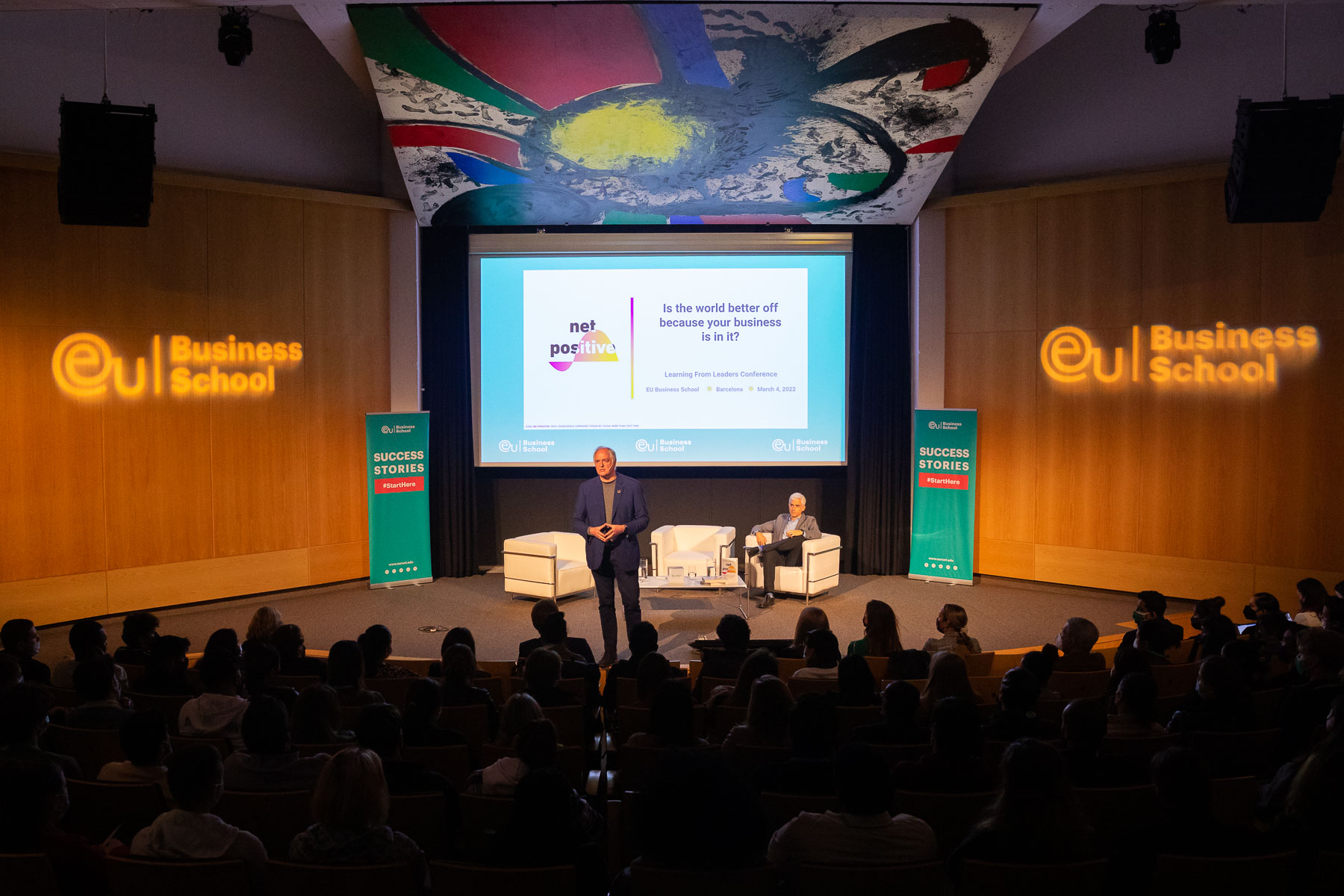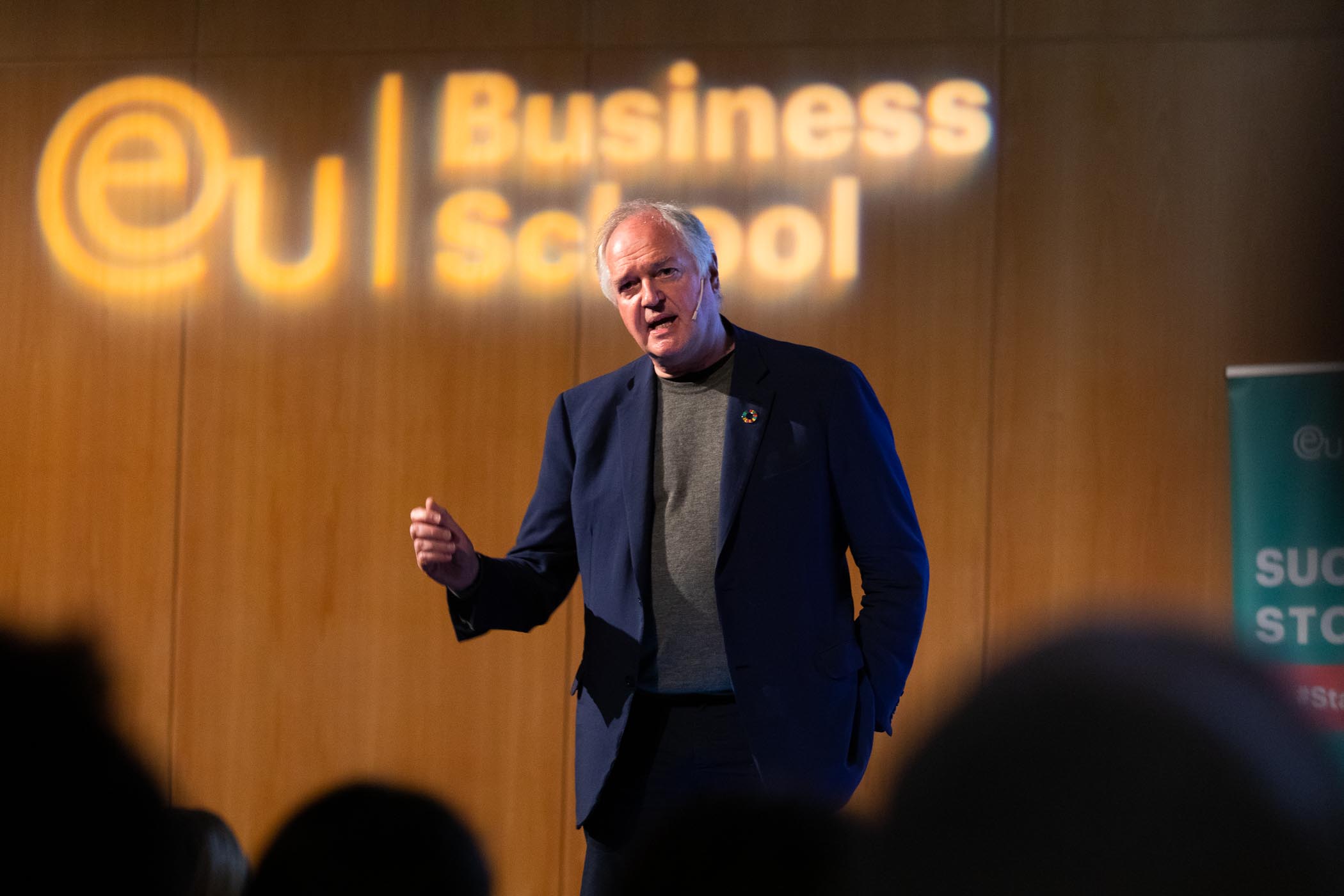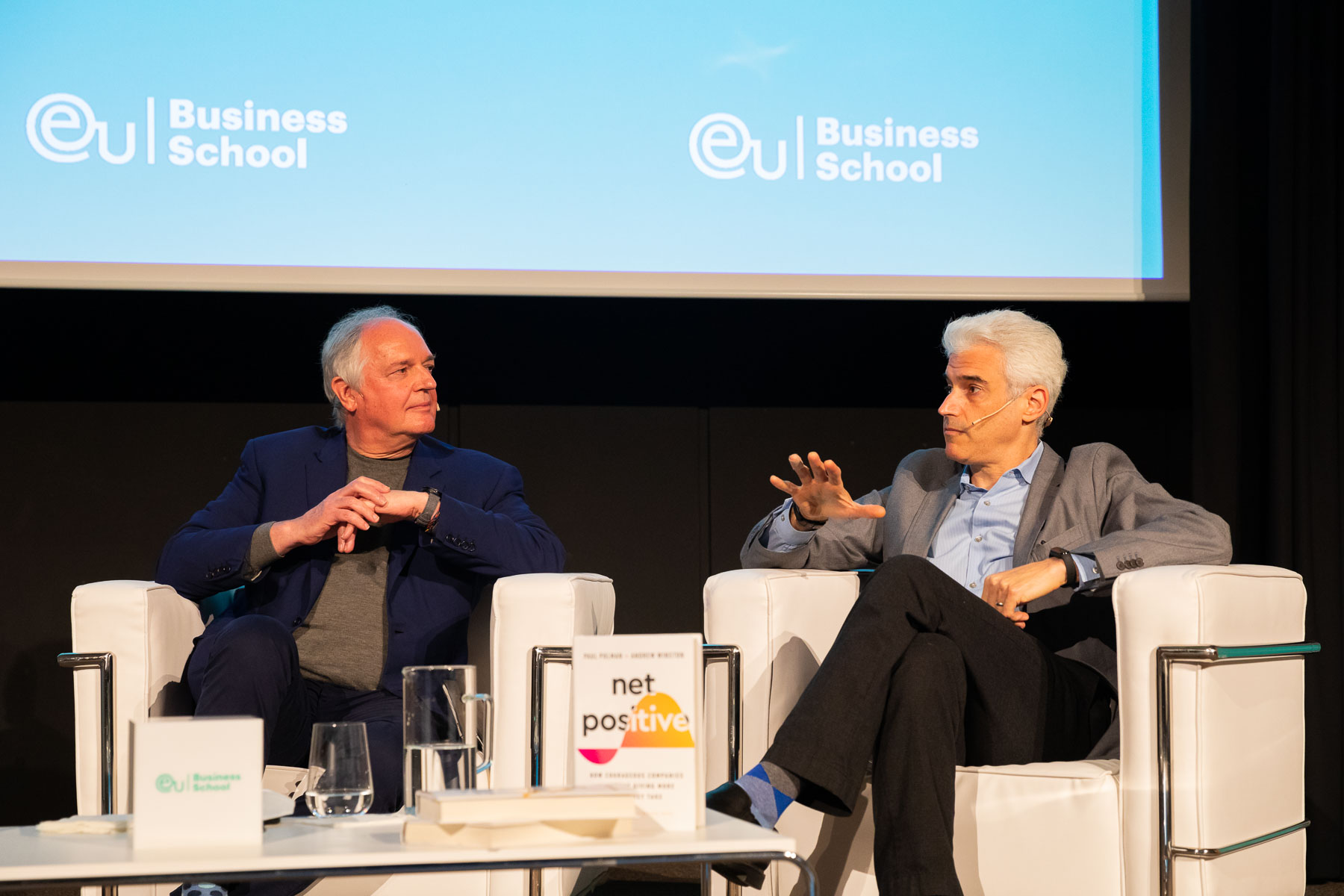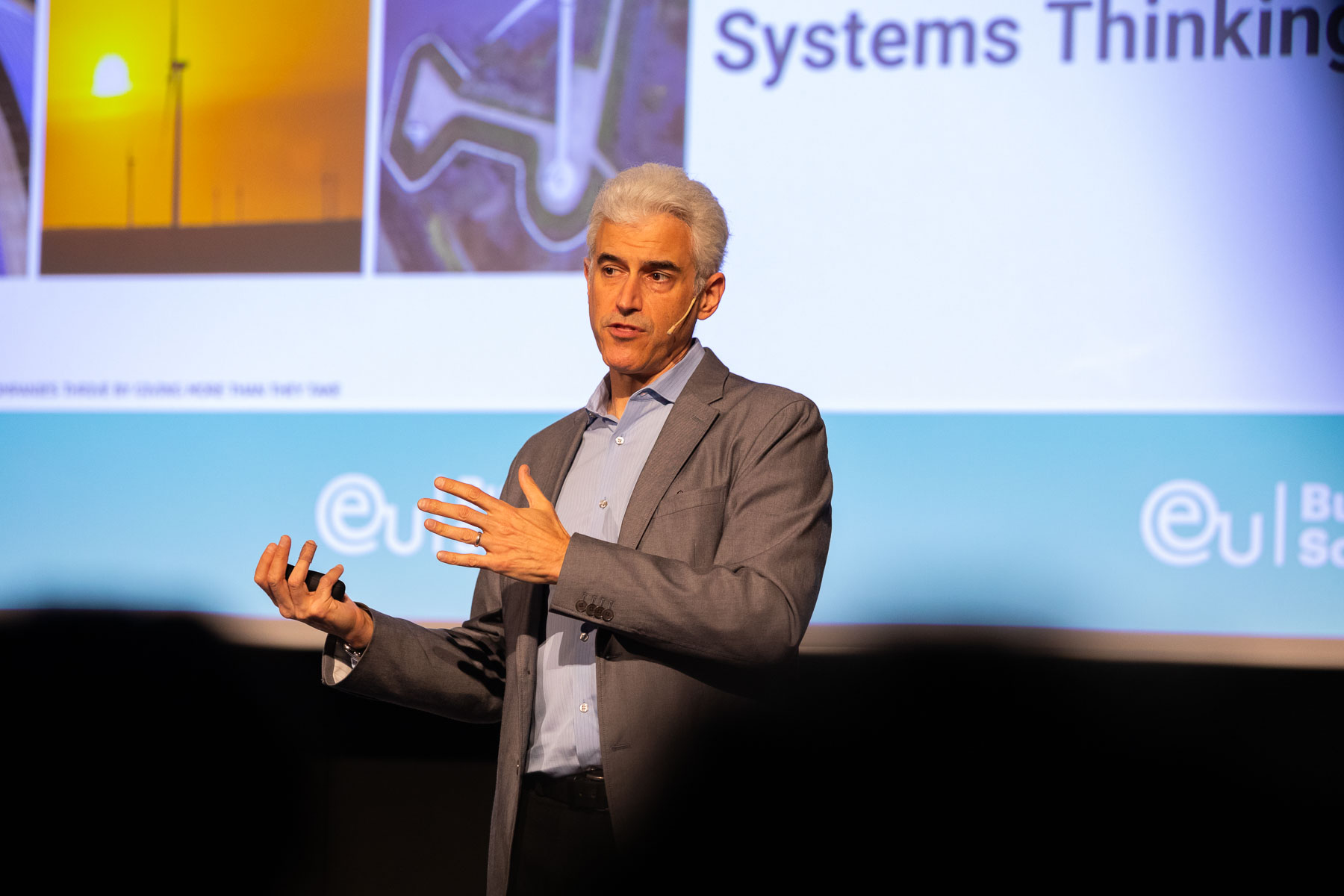“You can’t have infinite growth on a finite planet” – Net Positive co-authors Paul Polman and Andrew Winston
It is a simple question, albeit one that leaves multiple business owners struggling for an answer: how does your company make the world a better place by being in it? To answer this question, EU Business School invited Net Positive co-authors Paul Polman, CEO of Unilever (2009-2019), and Andrew Winston, thought leader and best-selling author on megatrends and sustainability, to give a stimulating in-person conference in Barcelona. During this enlightening event, these accomplished executives encouraged students to embrace a new, more responsible approach to corporate leadership, the net positive approach.
Read on to find out what it means to be net positive and, as stated by Sir Richard Branson, founder of Virgin Group, “to step up the greatest opportunity and responsibility of our time”.
When asked what the purpose of their business is, many CEOs offer a stock response about maximizing returns for shareholders, or perhaps the desire to continue a family venture. Missions, if they are mentioned at all, are vaguely defined – a kind of side product of a company’s main function of generating profit. Paul and Andrew argue that there is a necessary, and more responsible alternative. “We’re testing a system that isn’t really designed to deliver anymore,” says Ex-CEO of Unilever, Paul, explaining that urgent reform in the way business leaders operate is required for building a thriving future for all. Companies can no longer just list a set of core values in order to appease stakeholder concerns. They must instead look beyond short-term profits to understand how their existence impacts people and the planet at each stage of the value chain. “A net positive business, the way we’re defining it, is one that profits and thrives…by solving the world’s problems, not creating them,” explains Andrew, “this is an important kind of mental extension to have companies think about that larger context.”


Perpetual Production Meets Finite Resources
It is this central concept – creating good as opposed to generating harm – that defines a net positive venture. Encapsulating the need for pushback against traditional capitalist business structures, Paul emphasizes that “you can’t have infinite growth on a finite planet, and anything you can’t do forever is by definition unsustainable.”
Despite an increased worldwide focus on climate solutions, global warming and social inequality remain the most pressing issues facing humanity. “They’re two sides of the same coin,” explains Paul. While he acknowledges that progress has been made towards the elimination of economic disparity, he questioned the apparent insurmountability of carrying out reparative strategies over the long term: “Why not finish the job and irreversibly eradicate poverty, and do that in a more sustainable and equitable way, in the 15 years from 2015 to 2030?”
While many CEOs are becoming aware of the need for alternatives, there is little guidance available on how to proceed when it comes to breaking away from the norm. In the absence of direction beyond the surface-level greenwashing tropes that remain rife within many companies’ CSR pledges, leaders can find themselves in the dark regarding efficient sustainability actions, lacking knowledge of how to implement effective changes in their business models.
The net positive approach consists of a radical repositioning away from the traditional shareholder-centric model that has dominated the corporate world for the last century. Referencing the power structures that shapes the way in which many businesses are run, Paul notes that: “the world has moved on, but these global institutions are kind of static.” Reducing the influence of entrenched organizations may appear to be an insurmountable task, but the author remains cautiously optimistic, noting that in the wake of the COVID-19 pandemic, there has emerged “a moment of reflection, a moment of realization of what is happening in this world.”


The Conscious Consumer
The majority of CEOs would likely balk at the prospect of deprioritizing shareholder interests, and indeed, it is no easy task to move into long-term as opposed to quarterly thinking. “That goes against the direct pressure that companies feel from investors, from really everyone for years, but it is changing,” notes Andrew. While the myth remains that the approach would impede profits, recent studies have revealed a deep shift in stakeholder mindsets that support a new approach to profit and growth.
Many people now demonstrate a preference for engaging with companies that have clearly defined ethical purposes (sustainable brands such as Patagonia and Schneider Electric are frequently cited examples), and are actively eschewing profit-at-any-cost giants – a substantial proportion of which have been sheltered from having to execute serious CSR strategies. Paul elaborates on this evolution: “rapidly, the financial market is moving from seeing this as a threat, or a risk, or a reputational issue to an enormous opportunity,” he explains, with profit through purpose set to become a business standard across a range of industries. As an antidote to concerns regarding profit losses, Paul notes that business owners can benefit from taking a moment to reflect on their own conditioning: “…what we find is that companies that are more purpose driven now, that operate under the longer term, try to satisfy all of their stakeholders – not just their shareholders – are actually getting a higher return, actually more resilient.”


The Total Handprint
There is no fixed route towards successfully meeting sustainable development goals. Some companies, such as Google and Microsoft, engage in retroactive neutrality – for example, offsetting total carbon consumption since their founding – a concept commonly known as the net zero approach. While this type of strategy goes some way to redressing the balance regarding the undesirable consequences of traditional production methods, the net positive approach goes much further, leading to the creation of a new company model that “takes responsibility for its total impact in society, its true footprint, and builds a positive set of impacts, its total handprint.” For future companies, operational transparency is likely to be rendered an expected, as opposed to an optional, facet of business.
In practice, effective reforms that companies may carry out are industry dependent. Businesses can embrace alternative ways of operating that create returning benefits for their sectors. Agricultural companies may implement regenerative farming methods which improve soil quality and shelter biodiversity from the impact of more aggressive traditional cultivation techniques, for example.
People First
The north star of the new movement lies in its continual refocusing on people above all else, however. “What we’re talking about here really is bringing humanity back to business,” explains Andrew, elaborating that a deficit of soft skills such as emotional empathy, and awareness of the experiences of marginalized demographics – deficits which were once considered an unfortunate but inevitable and necessary driver for success – has resulted in operational systems ranging from cruel to inhumane. While each venture must take its own industry-specific needs into account, the broadening of perspectives to incorporate the needs and desires of LGBTQ and BIPOC stakeholders – demographics typically ignored or actively exploited by traditional business models – is a process that can be undertaken by any company in operation. By encouraging leaders to listen first, and to take an active interest in the lives of those whom their work both relies on and impacts, businesses can help to improve both living and working conditions for those who experience social discrimination and its accompanying financial oppression.


In setting out to tackle these challenges, Andrew highlights “the transformative nature of partnership,” explaining that companies can carry out beneficial measures more effectively by taking synergy-based approaches to business, as opposed to falling back on more aggressive takeover-oriented mindsets. Having reflected on the essential qualities that net positive leaders must possess at the individual level, he places courage at the top of the list. “It takes courage to say to Wall Street, we’re not going to talk to you every quarter, we want to think in the long run.” Redefining success beyond a company’s stock price or a country’s GDP, is not for the faint of heart, but there is a path laid out for those willing to try.


The in-person conference given by Paul and Andrew was the first step in EU’s mission to form the responsible business leaders of tomorrow. As a second step, EU students will take an exclusive Net-Positive masterclass where they will dive deeper into this revolutionary business approach, the aim of which is to ensure a better future for all.











